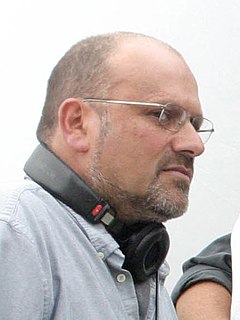A Quote by Midge Decter
We're not in the middle east to bring sweetness and light to the whole world. That's nonsense. We're in the middle east because we and our European friends and our European non-friends depend on something that comes from the middle east, namely oil.
Related Quotes
I think the public is very reluctant to get involved in more foreign wars, especially in the Middle East. And they understand, implicitly, that we go to war in the Middle East because of oil. And if we don't want to go to war in the Middle East, then we have to do something about the oil problem. And I think that view is gaining ground in the U.S.
Peace in Syria is not only our priority; it's a Middle Eastern priority, and when the Middle East is stable, the rest of the world is stable, because the Middle East is the heart of the world geographically and geopolitically, and Syria is the heart of the Middle East geographically and geopolitically.
Israel's democracy is the bedrock on which our relationship stands. It's a shining example for people around the world who are on the frontline of the struggle for democracy in their own lands. Our relationship is also based on our common interest in a more stable and peaceful Middle East, a Middle East that will finally accord Israel the recognition and acceptance that its people have yearned for so long and have been too long denied, a Middle East that will know greater democracy for all its peoples.
Sadly, a U.S. invasion of Iraq 'would threaten the whole stability of the Middle East' - or so Amr Moussa, secretary-general of the Arab League, told the BBC on Tuesday. Amr's talking points are so Sept. 10: It's supposed to destabilize the Middle East. The stability of the Middle East is unique in the non-democratic world and it's the lack of change in Iraq, Iran, Saudi Arabia, Syria, Egypt that's turned them into a fetid swamp of terrorist bottom-feeders.
Israel is the American watchdog in the Middle East, and that's why the Palestinians remain victims of one of the longest military occupations. They don't have oil. If they were the Saudis, they wouldn't be in the position they are now. But they have the power of being able to upset the imperial order in the Middle East.
It was important for me to show that Beirut and Lebanon were once the pearl of the Middle East. Beirut was once called the Paris of the Middle East and to have that feeling of a destroyed place that once was beautiful and glamorous and visually impressive was important. I think it's even sadder to get the feeling that this country, and indeed the whole Middle East, could have been a major force in the world if people would get together and forget about destruction, death and wars. But unfortunately, it's not happening yet.
There is a real need to construct a different Middle East. The Middle East must change because the world has changed. And instead of oppositional armies that are fighting usually one against another, now we have a net of terrorists that are trying to destroy everything. They are not two; they are hundreds.
The last few years I've been doing the Middle East thing, and it's a tough decision whether to go there and try and knock off some events as a European Tour member, this year I think overall looking at my results, I played a little bit better on the West Coast than I have in the Middle East, so that was another determining factor for coming back here to an event that I have had some success in the past.

































